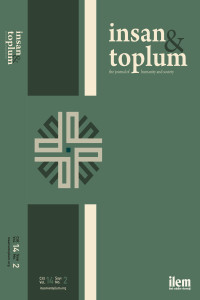Ukrayna ve Suriye İnsani Krizi Örneklerinde Avrupa Birliği'nin Göç Politikalarının Teorik Analizi: Bir Kimlik Dışlaması mı? Yabancı Düşmanı Bir Çifte Standart mı?
Abstract
Bu çalışmada Avrupa Birliği’nin göç politikalarında Ukraynalı ve Suriyeli mültecilere yönelik farklı tutumları incelenmiştir. Bu tutumların düşünsel altyapısı, uluslararası toplum olgusuna vurgu yapan İngiliz Okulu, ortak kimlik inşasına vurgu yapan Sosyal İnşacılık teorisi ve siyasal bir olguyu güvenlik sorunu haline getirme sürecini inceleyen Güvenlikleştirme teorisi çerçevesinde incelenmiştir. Bu yaklaşımlara ek olarak Avrupa Birliği’nin göç politikalarındaki çifte standardın nedenleri de coğrafi yakınlık çerçevesinde incelenmiştir. Metinde Avrupa ülkelerinin tarihsel hafızalarının göç politikalarını ne ölçüde etkilediği vurgulanmıştır. Temelde benzer iki olay karşısında Avrupa Birliği’nin farklı tutumlarının teorik analizi yapılarak, bu politikaların nasıl yabancı düşmanlığına evrildiği ve Batı Avrupa’daki mevcut yabancı düşmanlığı olgusundan nasıl beslendiği incelenmiştir. yabancı düşmanlığının Batı Avrupa’da sosyo-psikolojik bir olgu olduğu ve bu olgunun hem günlük popülist politikaların belirlenmesinde hem de mülteci politikaları karşısında tercih edilen tutumlarda etkili olduğu görülmektedir.
References
- Mudde, C. (2019). The far right today. Polity Press.
- O’Grady, S. (31 October 2018). Remember the Camerawoman Who Kicked Refugees? She Was Just Acquitted.
- The Washington Post. Retrieved 26 February 2023 from https://www.washingtonpost.com/world/2018/10/31/remember-camerawoman-who-kicked-refugees-she-was-just-acquitted/
- Onuf, N. (1989). World of Our Making: Rules and rule in social theory and international relations. University of South Carolina Press.
- Polat, C. (2006). The immigration policy and process of European integration: Supranationalism versus intergovernmentalism? Ankara Review of European Studies, 6(1), 69-80.
A Theoretical Analysis of The European Union’s Immigration Policies in The Case of The Ukraine and Syria Humanitarian Crisis: Is It an Identity Exclusion? A Xenophobic Double Standard?
Abstract
In this study, the different attitudes of the European Union towards Ukrainian and Syrian refugees in its migration policies were examined. The intellectual infrastructure of these attitudes is analyzed within the framework of international relations theories such as The English School, which emphasizes the phenomenon of international society, Social Constructivism theory which emphasizes the construction of common identity and Securitization theory, which examines the process of making a political phenomenon a security issue. In addition to these approaches, the reasons for the double standard of the European Union in their migration policies are also examined in terms of the framework of geographical proximity. It emphasized to what extent the historical memories of European countries have an impact on their migration policies in the text. The theoretical analysis of the different attitudes of the European Union in the face of basically two similar events examined how these policies evolved into xenophobia and how they are fed by the current xenophobic phenomenon in Western Europe. In conclusion, it can be stated that xenophobia is a socio-psychological phenomenon in Western Europe, and this phenomenon is effective both in the determination of daily populist politics and in the attitudes preferred in the face of refugee policies.
References
- Mudde, C. (2019). The far right today. Polity Press.
- O’Grady, S. (31 October 2018). Remember the Camerawoman Who Kicked Refugees? She Was Just Acquitted.
- The Washington Post. Retrieved 26 February 2023 from https://www.washingtonpost.com/world/2018/10/31/remember-camerawoman-who-kicked-refugees-she-was-just-acquitted/
- Onuf, N. (1989). World of Our Making: Rules and rule in social theory and international relations. University of South Carolina Press.
- Polat, C. (2006). The immigration policy and process of European integration: Supranationalism versus intergovernmentalism? Ankara Review of European Studies, 6(1), 69-80.
Details
| Primary Language | English |
|---|---|
| Subjects | International Migration, International Relations (Other) |
| Journal Section | Research Articles |
| Authors | |
| Publication Date | June 7, 2024 |
| Published in Issue | Year 2024 Volume: 14 Issue: 2 |

